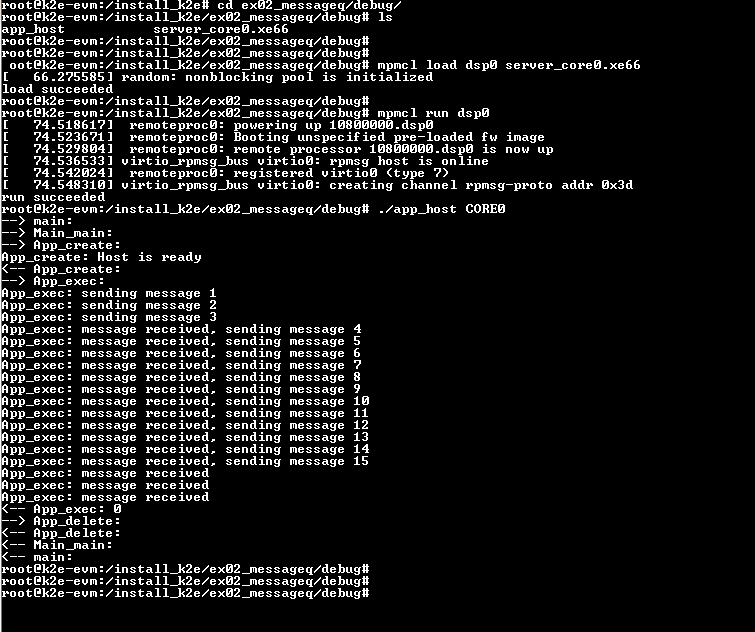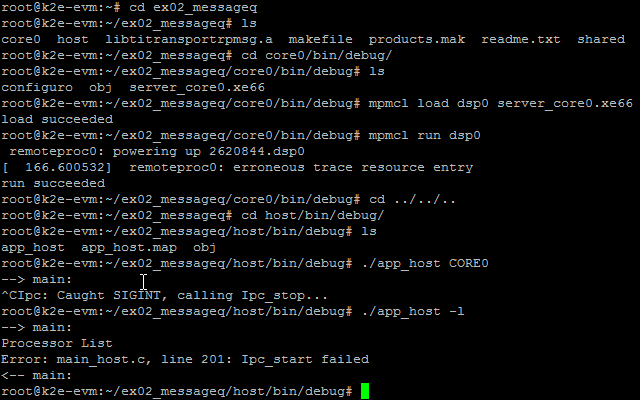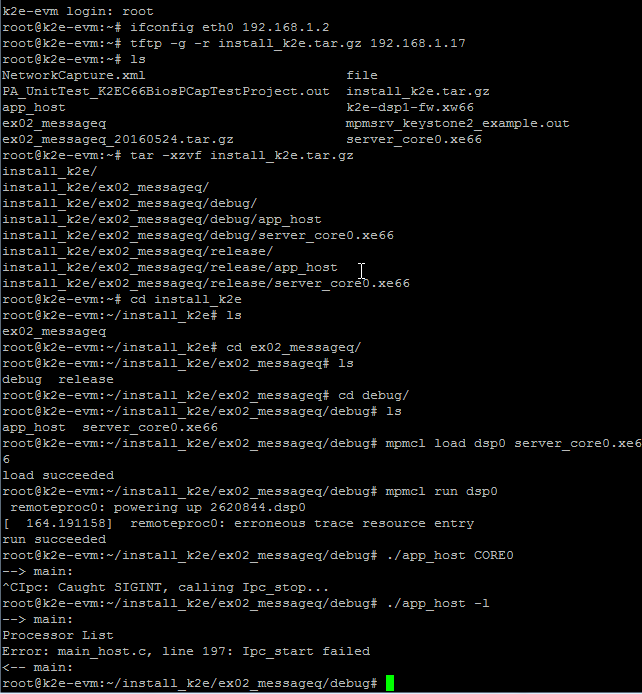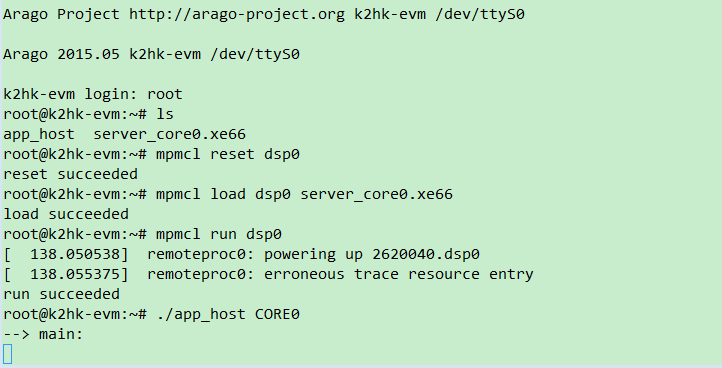I have installed ti-processor-sdk-linux-k2e-evm and ti-processor-sdk-rtos-k2e-evm and rebuilt the IPC library successfully. Then I build the ex02_messageq example and get two files named app_host and server_core0.xe66. I download these files into the k2e evm below "/lib/firmware" folder. But when I run the app_host and get the info. as follows.
root@k2e-evm:~# ./app_host -l
--> main:
Processor List
Error: main_host.c, line 201: Ipc_start failed
<-- main:
root@k2e-evm:~# ./app_host DSP
--> main:
^CIpc: Caught SIGINT, calling Ipc_stop...
root@k2e-evm:~# ./app_host -h
--> main:
Usage:
app_host [options] procName
Arguments:
procName : the name of the remote processor
Options:
h : print this help message
l : list the available remote names
Examples:
app_host DSP
app_host -l
app_host -h
I failed to start IPC and it seemed the program can't find the other core. My app_host.c list as follows.
/* * Copyright (c) 2013-2015 Texas Instruments Incorporated - http://www.ti.com * All rights reserved. * * Redistribution and use in source and binary forms, with or without * modification, are permitted provided that the following conditions * are met: * * * Redistributions of source code must retain the above copyright * notice, this list of conditions and the following disclaimer. * * * Redistributions in binary form must reproduce the above copyright * notice, this list of conditions and the following disclaimer in the * documentation and/or other materials provided with the distribution. * * * Neither the name of Texas Instruments Incorporated nor the names of * its contributors may be used to endorse or promote products derived * from this software without specific prior written permission. * * THIS SOFTWARE IS PROVIDED BY THE COPYRIGHT HOLDERS AND CONTRIBUTORS "AS IS" * AND ANY EXPRESS OR IMPLIED WARRANTIES, INCLUDING, BUT NOT LIMITED TO, * THE IMPLIED WARRANTIES OF MERCHANTABILITY AND FITNESS FOR A PARTICULAR * PURPOSE ARE DISCLAIMED. IN NO EVENT SHALL THE COPYRIGHT OWNER OR * CONTRIBUTORS BE LIABLE FOR ANY DIRECT, INDIRECT, INCIDENTAL, SPECIAL, * EXEMPLARY, OR CONSEQUENTIAL DAMAGES (INCLUDING, BUT NOT LIMITED TO, * PROCUREMENT OF SUBSTITUTE GOODS OR SERVICES; LOSS OF USE, DATA, OR PROFITS; * OR BUSINESS INTERRUPTION) HOWEVER CAUSED AND ON ANY THEORY OF LIABILITY, * WHETHER IN CONTRACT, STRICT LIABILITY, OR TORT (INCLUDING NEGLIGENCE OR * OTHERWISE) ARISING IN ANY WAY OUT OF THE USE OF THIS SOFTWARE, * EVEN IF ADVISED OF THE POSSIBILITY OF SUCH DAMAGE. */ /* * ======== main_host.c ======== * */ /* cstdlib header files */ #include <stdio.h> #include <stdlib.h> /* package header files */ #include </usr/local/ti/ipc_3_42_00_02/ipc_3_42_00_02_lib/include/ti/ipc/Std.h> #include </usr/local/ti/ipc_3_42_00_02/ipc_3_42_00_02_lib/include/ti/ipc/Ipc.h> #include </usr/local/ti/ipc_3_42_00_02/ipc_3_42_00_02_lib/include/ti/ipc/transports/TransportRpmsg.h> #include </usr/local/ti/ipc_3_42_00_02/ipc_3_42_00_02_lib/include/ti/ipc/MultiProc.h> /* local header files */ #include "App.h" /* private functions */ static Int Main_main(Void); static Int Main_parseArgs(Int argc, Char *argv[]); #define Main_USAGE "\ Usage:\n\ app_host [options] procName\n\ \n\ Arguments:\n\ procName : the name of the remote processor\n\ \n\ Options:\n\ h : print this help message\n\ l : list the available remote names\n\ \n\ Examples:\n\ app_host DSP\n\ app_host -l\n\ app_host -h\n\ \n" /* private data */ static String Main_remoteProcName = NULL; /* * ======== main ======== */ Int main(Int argc, Char* argv[]) { Int status; printf("--> main:\n"); /* parse command line */ status = Main_parseArgs(argc, argv); if (status < 0) { goto leave; } /* configure the transport factory */ Ipc_transportConfig(&TransportRpmsg_Factory); /* Ipc initialization */ status = Ipc_start(); if (status >= 0) { /* application create, exec, delete */ status = Main_main(); /* Ipc finalization */ Ipc_stop(); } else { printf("Ipc_start failed: status = %d\n", status); goto leave; } leave: printf("<-- main:\n"); status = (status >= 0 ? 0 : status); return (status); } /* * ======== Main_main ======== */ Int Main_main(Void) { UInt16 remoteProcId; Int status = 0; printf("--> Main_main:\n"); remoteProcId = MultiProc_getId(Main_remoteProcName); /* application create phase */ status = App_create(remoteProcId); if (status < 0) { goto leave; } /* application execute phase */ status = App_exec(); if (status < 0) { goto leave; } /* application delete phase */ status = App_delete(); if (status < 0) { goto leave; } leave: printf("<-- Main_main:\n"); status = (status >= 0 ? 0 : status); return (status); } /* * ======== Main_parseArgs ======== */ Int Main_parseArgs(Int argc, Char *argv[]) { Int x, cp, opt, argNum; UInt16 i, numProcs; String name; Int status = 0; /* parse the command line options */ for (opt = 1; (opt < argc) && (argv[opt][0] == '-'); opt++) { for (x = 0, cp = 1; argv[opt][cp] != '\0'; cp++) { x = (x << 8) | (int)argv[opt][cp]; } switch (x) { case 'h': /* -h */ printf("%s", Main_USAGE); exit(0); break; case 'l': /* -l */ printf("Processor List\n"); status = Ipc_start(); if (status >= 0) { numProcs = MultiProc_getNumProcessors(); for (i = 0; i < numProcs; i++) { name = MultiProc_getName(i); printf(" procId=%d, procName=%s\n", i, name); } Ipc_stop(); } else { printf( "Error: %s, line %d: Ipc_start failed\n", __FILE__, __LINE__); goto leave; } exit(0); break; default: printf( "Error: %s, line %d: invalid option, %c\n", __FILE__, __LINE__, (Char)x); printf("%s", Main_USAGE); status = -1; goto leave; } } /* parse the command line arguments */ for (argNum = 1; opt < argc; argNum++, opt++) { switch (argNum) { case 1: /* name of proc #1 */ Main_remoteProcName = argv[opt]; break; default: printf( "Error: %s, line %d: too many arguments\n", __FILE__, __LINE__); printf("%s", Main_USAGE); status = -1; goto leave; } } /* validate command line arguments */ if (Main_remoteProcName == NULL) { printf("Error: missing procName argument\n"); printf("%s", Main_USAGE); status = -1; goto leave; } leave: return(status); }
I think there must be some steps between download the server_core0.xe66 and app_host and run the app_host. Can you tell me what's it?






